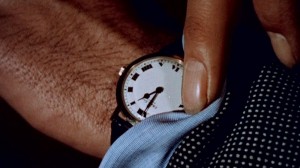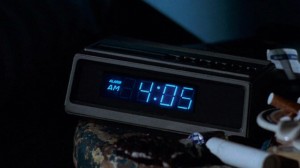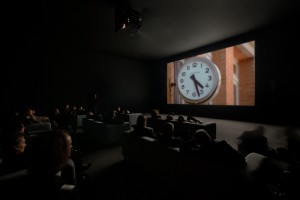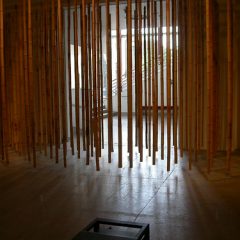Shared memories of Star Wars and Buster Keaton serve as a lingua franca that crosses international and personal borders. Unlike art, which in so many ways aims at an elite audience and serves to differentiate the into-art group from other people, the love of movies unites us all.

When Christian Marclay created The Clock, his 24-hour video cycle that mashes up movies by the minute, who did he have in mind as his audience? Only visual art lovers? Or everyone? Was he hoping his bouquet to the movies and to time would earn him a new audience, a crowd of cinephiles? Or did he dream of 300 cognoscenti art fans obsessive enough to sit, butts pasted to a seat in a gallery, for all 24 hours? Or perhaps he had in mind a very rich collector who is also a film fan, willing to buy video at an unusually high price because of its pop culture references–or because it was by the internationally recognized Christian Marclay, or just because the collector and The Clock clicked.
I don’t suppose this video, four years in the making, will ever be distributed by NetFlix, but I think it has chops as a cult classic for a pop audience. The economics of NetFlix and of video art are mutually unsupportive. I can’t imagine the leap, and yet I think it ought to be possible in this particular case. (Do we have to wait until the collectors are dead to make it happen? I don’t mean to be irreverent here. I am just wondering how it would work.)

The Clock, if you missed all the fuss– and missed it at Paula Cooper Gallery, Museum of Fine Arts in Boston, the Museum of Contemporary Art in Sydney, the Centre Pompidou in Paris, and the Hayward Gallery at London’s Southbank Centre–grabs brief movie clips that reference time via watches, clocks, and dialog, edited to mark and sync by the minute with real time. If The Clock shows 1:35 in the afternoon on a watch ticking on the screen, then it’s 1:35pm on my cellphone. To put it another way, The Clock is a clock, and a viewer gets to watch time fly as the editing nimbly stitches together scenes from different movies, old with new, memorable moments with nondescript ones. People eat in a restaurant in black and white. The same restaurant noises carry over into the next clip of people eating in a restaurant a minute later, taken from a color movie. It’s still lunch time!
Without a plot, The Clock plots not just time but a steady stream of anticipation for the next film clip, enticing us to await the next flash flood of fond moments from the screen libraries of our minds. This is movie history presented in tids and bits, connected thematically, visually, aurally, musically–in all the ways a video can create segues without the benefit of sequential storytelling. But sequential storytelling is the strongest suit of this time-based medium! So in subverting film’s number one strength, Marclay uses The Clock to create a sort of contemplative, open work, i.e. art rather than a traditional movie.

The Clock in Lincoln Center’s David Rubenstein Atrium, 63rd and Broadway, is in a small, specially built theater, austere looking in the dimness, with rows of rectilinear but pillowed couches lined up like church pews. The reverence carries over into the deafening silence of the audience, worshipfully gazing as the thousands of movie clips play out the time.
I went on a hot Saturday at 1ish, and had no line to contend with, btw. There have been lines (the small theater seats only about 90, and we’re talking about New York).
The moment I began to watch, I regretted there was no way to channel my excitement over identifying characters, actors, movies. I wanted to stand and shout Pam Greer, Jackie Brown. I wanted that communal movie mania and passion we all are gripped with when we challenge one another to remember favorite moments of movie trivia. I also yearned for by-the-minute serial list of clip sources since I didn’t have my friends to share guesses with.
Wouldn’t this be even more fun if, like at Rocky Horror Picture Show, the fans got to shout the lines? Or even better, wouldn’t it be great if we could watch this at home with our BFFs, challenging one another to be the first to ID what’s before us. We could keep score and have winners and losers. Oh, sure, some of the contemplation would go. And some of the magic of feeling time move forward in our bones as we watch it progress in front of our eyes would be interrupted. And then some of the mental meanderings of the meaning of time and movies and movie- and cultural history would be gone.
But something else wonderful would take place. Because in all honesty, The Clock does more than keep time. It’s a love story–the tale of the most important form of the art of storytelling today, the one that has overtaken the culture-defining story forms of the past–oral and written fables, eddas, bibles and epics. This cinematic tick list of time and love of film and pop culture would flourish in a less self-consciously arty form of presentation. Get out the popcorn and I’ll shout: Ronald Reagan, Klaus Kinski, that’s Susan Sarandon; I love you, Marcello Mastroianni, Robert Redford, Clint Eastwood, Marlena Dietrich. Silence of the Lambs, The Grifters, Fanny (I could swear it; if I’m wrong you’ll tell me.). We would wait together as time ticks toward seductions and explosions. Yesterday. Today. Next. Coming soon in theaters near you.
The Clock’s time at Lincoln Center runs out Aug. 1. It plays Tuesday through Thursday, 8am to 10pm, and rocks around the clock on weekends, beginning 8am Fridays to 10pm Sundays.








